|
 |
Wayne County, NC GenWeb |

|
Moses Pipkin Family
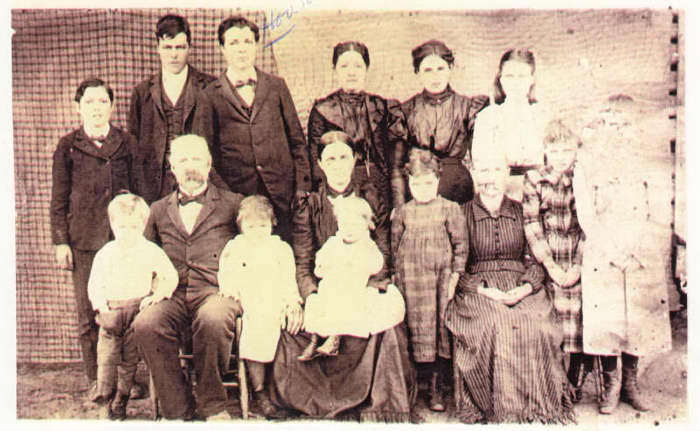
Photos contributed by Samuel Pipkin
1)
John Pipkin d. 1745, Chowan County (Gates County-Reynoldson Twshp)
2) Joseph Pipkin d. 1789, Wayne County
3) Willis Pipkin d. 1818, Wayne County
4) Mills Pipkin d. 1818, Wayne County
5) Asher Pipkin d. bef. 1869, Wayne County
6) Moses Pipkin
Moses, son of Asher and Maria Rose Pipkin of Grantham Township, was born 21 Aug 1845 and died 2 Jan 1932 and is buried in Morgan Cemetery near Rhodes Friends Church. He married Cynthia Coats on 9 Apr 1873. Cynthia was the daughter of William G. Coats and wife Emily Hudson of Sampson County.
Moses and Cynthia's children were William Asher, Lola Jane, Moses Howard, Ernest James, Ida Lina, Emily Maria, Cynthia Ella Mae, Thenia Pearl, Luther Daniel, Mary Cogdell and Sally Genero Pipkin. Family history states Moses made a living making bricks of the clay from the hillside where they lived near the Falling Creek Run near Grantham. After the bricks were shaped in a mold they were cured in a brick kiln. Over the years the heat from the kiln caused Grandpa to have red rimmed eyes, which made his look scary.
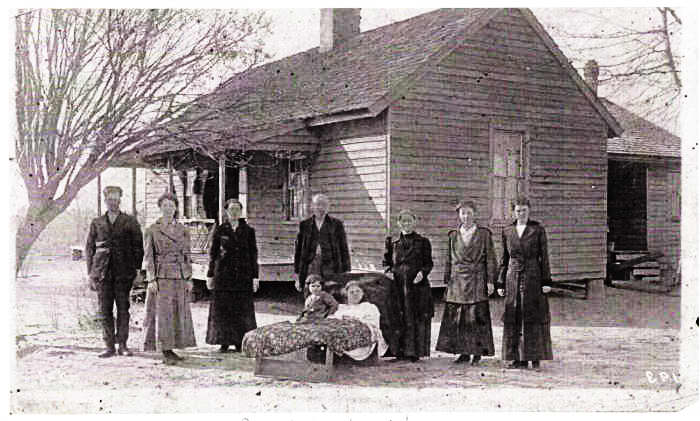
"North Carolina Troops, 1861-1865, A Roster" - Comapny A, 2nd Regiment NC Junior Reserves - Moses Pipkin, born in Wayne County and was by occupation a farmer prior to enlisting in Wayne County in April, 1864 (age 19), for the war. Name appears on a receipt roll for clothing dated June 15, 1864. Survived the war. Family history states he did not serve as a soldier in active duty, but served the cause as cobbler, making shoes for the soldiers. Moses and Cynthia's Pension Applications - Images
"Fold3" - Moses Pipkin, Comapny A, 2 NC Junior Reserves (Confederate), Private.
Capt. Albert R. Hicks Company, Reserve Force, Junior Class. Company Muster Roll for April 1864 to - Enlisted Apr, 1864 in Wayne Co, NC by Lt. Wilson. Occupation Farmer born in Wayne Co, NC.
2 Jr Res, NC, Moses Pipkin Pvt Co A, 5 Battn NC Res. Appears on a Receipt Roll for clothing 2 Qr. 1864. Date of issue June 15, 1864. Images
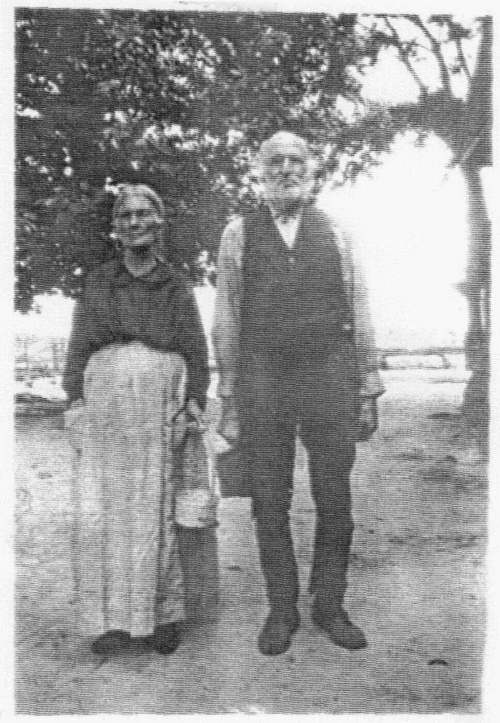
Cynthia and Moses Pipkin
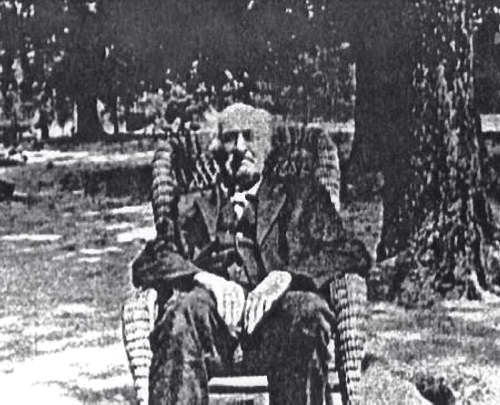
Moses Pipkin
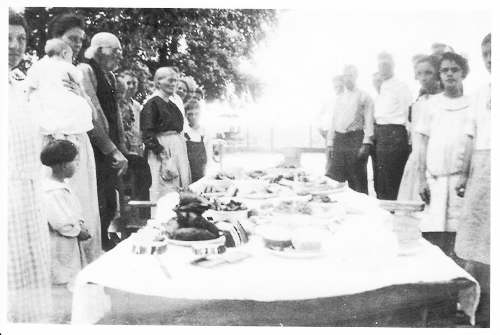
Pipkin Family Picnic
Moses Pipkin
By Lillian Pipkin Potts, wife of Edward Potts and daughter of Ernest James Pipkin
My grandfather Moses Pipkin was a wonderful man to me. I wanted to think I was special to him because I was the first grandchild (1907). When I was visiting in his home, I followed him around the farm. My memories are quite vague as to where we went and what we did. I was just happy to be with him. His history, before I remember, was given to me by my father, Ernest James Pipkin.
He owned a home on the hill of Falling Creek, between Corbit Hill and Grantham School. He had a large family and it was necessary to live at home in those days. He built a brick kiln and made bricks for a living. My father only went to school three months of the year and that was in the winter. He learned arithmetic by counting the bricks he put into the kiln. Other that arithmetic his education was skimpy.
He lost the farm and moved near Falling Creek School next door to a Dr. Kennedy. I remember visiting there only once. For some reason my father and mother decided to visit Dr. Kennedy on our way home. After we left Dr. Kennedy's I remembered that I had left something and we stopped to get it. When I jumped out of the buggy, I broke my right leg just above the ankle. Dr. Kennedy came to set it. When I awoke I was lying on a pallet close to the door. It must have been too late to go home when everything was finished because we went home the next day. They took the lid off a chest, laid it across my mother's and father's laps to carry me home. I remember Dr. Kennedy visiting me once at home, bringing some white grapes wrapped in his pocket handkerchief. My mother told me the handkerchief was so dirty she was afraid I would become sick.
The next time I remember my grandfather, they were living at the old Whitfield place. By that time he had retired from farming as far as I can remember. His two sons, Asher and Dan, did most of it. My grandfather and grandmother had a daughter, Cynthia Ella Mae, who was in invalid because of rheumatism. She had been stricken when she was six years old and became gradually more infirm. At the time that I first remember her, she could not move any part of her body except three fingers of her left hand and her right arm. She learned to read and write and as well as I remember a well educated young woman. She died at the age of 28 years in 1918.
My grandparents lived there for many years, then moved about half a mile toward highway 13, a part of the old Whitfield place. Sometime while they were there they found some of the silverware the Whitfields had buried during the Civil War. It was plain with a large "W" etched on the handles.
He moved his family, and a married son and his wife, over on highway 13 to the A.T. Griffin farm. While he was there he learned the trade of Basket making. He made bushel baskets, stand-up baskets (as I remember they would hold three bushels), lunch baskets (my sisters and brother and I had one ornamental flower basket), and bottomed chairs.
He and his son would go to the swamp looking a certain tree that would be easily riven into marrow slats. He had made a draw horse, a long board, one end weighted down on the ground, the other end stood on two legs. He cut a hole about eighteen inches from the upper end. Through that he made a plunger to pass through the hole. At the top of the plunger, he carved a block of wood. The plunger was on an axis. He used his foot to push the plunger below the board backward which caused the forward pressing down on the slat he wanted to dress off with the drawing knife. The knife was a piece of metal with a knife edge (sharp) and a handle on each side. When the slats were riven, a lot of little strings of wood were left. He wanted all of those off so the slats would be smooth. Before he started weaving the slats, they were soaked overnight in a tub of water to make them easier to handle. The soaking kept them from splitting and breaking. His craft was known far and wide in this area, and people came to buy his wares.
After living there many years, my grandparents moved to Patetown, a small village on the other side of Goldsboro. By that time my grandfather was too old to do anything, so he began to think about coming home to western Wayne County where he had lived so long. They moved to Union Academy Community. The children put him to bed when they arrived, and he never arose from that bed.
Home
|






